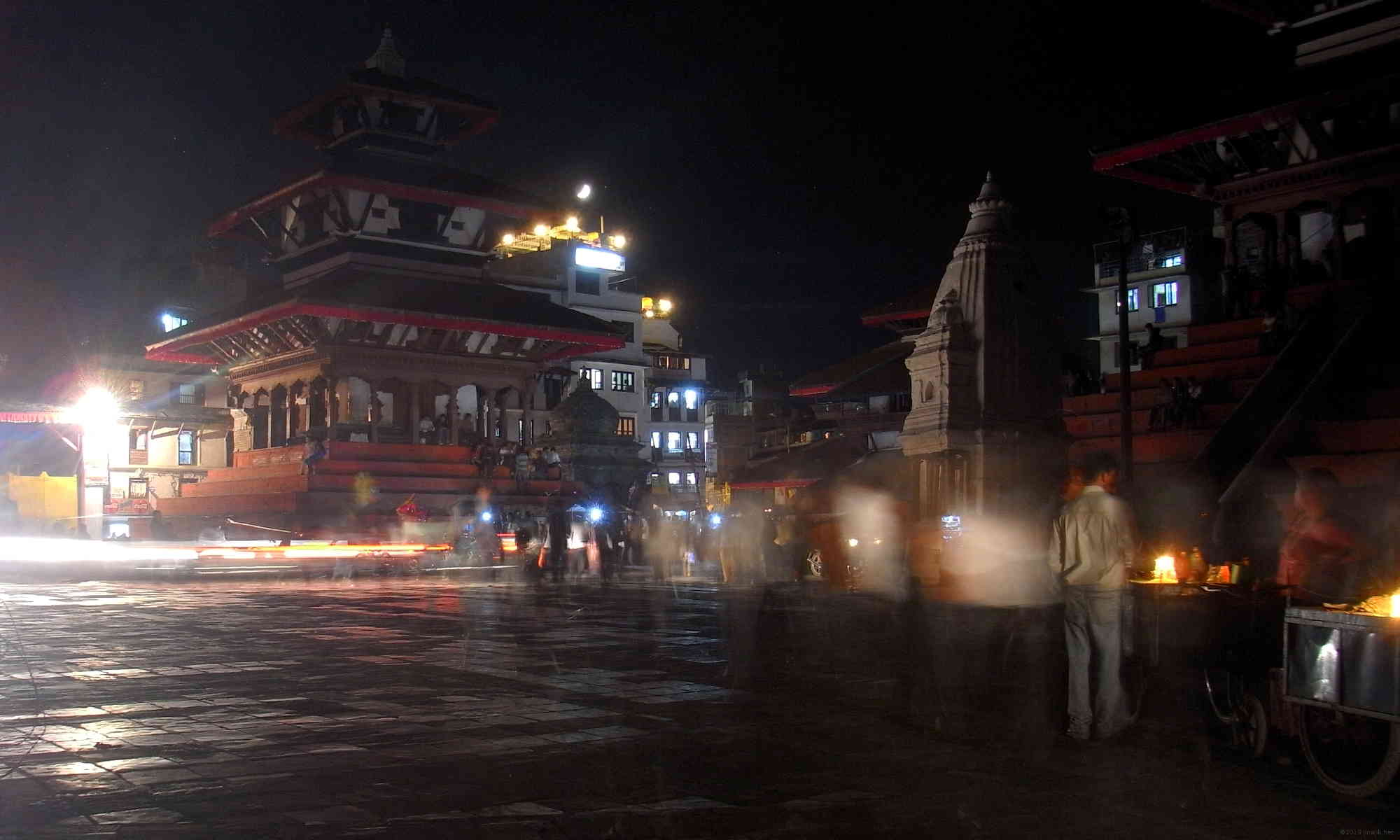
The First International Workshop on Early Tantra was held in Kathmandu a couple of weeks ago. [ The table wasn’t as kinky as it appears in the picture (of the concluding lecture, given by PDSz): it’s my laziness in stitching the images. ]
Earlier on in the Workshop, while in the thick of some intense reading, Prof. Alexis Sanderson at one point digressed to give an anecdotal (?) account of an “indigenous” (or, for the one or two anthros who may be reading: “emic”) definition of tantra. With all the agonizing about what tantra is or isn’t in the secondary literature, I feel that this cuts to the chase:
YOU GO TO THE GURU AND HE GIVES YOU DIKSHA. YOU RECITE THE MANTRA 10,000 TIMES AND THE GOD APPEARS AND SAYS ‘WHAT DO YOU WANT? GOVERNMENT JOB…? FAST CAR? TAKE IT’.
Facile as this may sound, it nonetheless alludes concisely to some fundamental aspects of the study of tantric literature. First is the point that tantric works are above all prescriptions for action, particularly initiatory, ritualized action in pursuit of worldly gain, before they are anything else. We can find all kinds of astounding things in the tantras, but one never gets completely away from this basic character. A tantric practitioner is of course often a seeker of liberation; but even here it is often the case that liberation is defined in terms of worldly benefit.
The second point, which comes naturally from the first, is that because tantras deal with practical matters, effort must be made to understand their prescriptions within the context of a living tradition. There is not, to my knowledge, such a thing as a tantric practice which is disconnected from some kind of functioning religious milieu, whether existing now or a millenium ago. Although we can consider certain elements within the domain of a pure and timeless theoretical space, others remain firmly grounded. If we lack sufficient familiarity with such an environment, whether through personal contact with its surviving representatives, or immersion in literature, art and history — or through whatever exposure is appropriate — then we must make the effort to acquire it. This seems obvious enough. But how often have we seen self-styled experts delivering verdicts on tantra that are devoid of such necessary background, quite plainly and embarassingly so?
Finally, I am reminded that tantric religion must be studied as it is found. As scholars, we must resist the tendency to jump to conclusions, impose our own views, on a discourse that is often opaque, if not disagreeable. Impartiality is a sword that cuts both ways: just as we should not strive to put a sheen on dull material, so too we should not overlook the fact that tantric literature is in places as sophisticated and erudite as any other branch of classical Indian literature. A scholar of the tantras may equally come across work that is utter rubbish or utterly profound — sometimes in the same sentence. Some topics characteristic of the tantras are still, after several decades of study, quite elusive to any modern understanding, and are resistant to attempts to place ourselves in the authors’ shoes.
One other thing that the Workshop brought home to me, though it had been becoming clear for some time, is that tantric studies is anything but for the credulous and the sub-literate. To get to grips with tantric texts one should ideally develop confidence and think critically in more than one, indeed several, registers and sectarian flavours of Sanskrit — and not just Sanskrit, for that matter, but vernaculars and — if focusing on Buddhism — Tibetan, Chinese, and the languages of a vast secondary literature.
Nor will it do to say ‘I don’t read anything else’ — something that I recently heard more than one Buddhist Studies professor proudly announce in public, with regard to their tiny little corner of Buddhism. In tantric studies that attitude won’t go very far. One needs to know as much as possible about what comes before, because tantric authors certainly did, to varying extents. These were not people who got out of bed one morning, somehow forgot all about their own traditions and just started making it all up again. They were innovators, absolutely; but at the same time, such people were all too well informed, and concerned, about accepted religious and philosophical trends, and we see this everywhere in the tantras.
In short, doing good tantric studies is as challenging as anything else out there in the humanities. And we can be grateful that the field once again has a growing number of people who are willing to face the challenge seriously.

